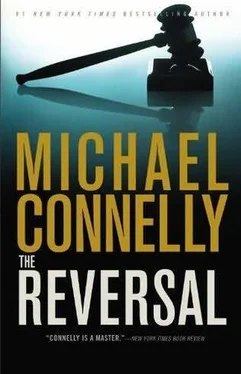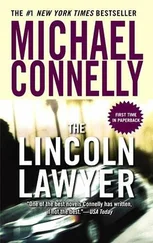“I’ll talk to him,” she said.
She furrowed her brow. It was a habit I’d seen before.
“What?”
“Nothing. I’m just thinking about how to attack this. I think we throw in a motion in limine, seeking to limit Royce on the impeachable stuff. We argue that the events of her life in between are not relevant to credibility if her identification of Jessup now matches her identification back then.”
I shook my head.
“I would argue that you’re infringing on my client’s sixth amendment right to cross-examine his accuser. The judge might limit some of this stuff if it’s repetitive, but don’t count on her disallowing it.”
She pursed her lips as she recognized that I was right.
“It’s still worth a try,” I said. “Everything is worth a try. In fact, I want to drown Royce in paper. Let’s hit him back with a phonebook to wade through.”
She looked at me and smiled.
“What?”
“I like it when you get all angry and righteous.”
“You haven’t seen anything yet.”
She looked away before it went a step further.
“Where do you want to set up shop this weekend?” she asked. “Remember, you have Hayley. She’s not going to like it if we work the entire weekend.”
I had to think about that for a moment. Hayley loved museums. To the point that I was tired of going to the same museums over and over. She also loved movies. I would need to check and see if a new movie was out.
“Bring her to my house in the morning and be prepared to work on our response. We can maybe trade off. I’ll take her to a movie or something in the afternoon and then you go on and do your thing with the SIS. We’ll make it work.”
“Okay, that’s a deal.”
“Or…”
“Or what?”
“You could bring her over tonight and we could have a little dinner celebrating our kid making second honors. And we might even get a little work on this done.”
“And I stay over, is that what you mean?”
“Sure, if you want.”
“You wish, Haller.”
“I do.”
“By the way, it was first honors. You better have it right when you see her tonight.”
I smiled.
“Tonight? You mean that?”
“I think so.”
“Then don’t worry. I’ll have everything right.”
Saturday, March 20, 8:00 P.M .
Because Bosch had mentioned that a prosecutor wanted to join the SIS surveillance, Lieutenant Wright arranged his schedule to work Saturday night and be the driver of the car the visitors were assigned to. The pickup point was in Venice at a public parking lot six blocks off the beach. Bosch met McPherson there and then he put a radio call in to Wright, saying they were ready and waiting. Fifteen minutes later a white SUV entered the lot and drove up to them. Bosch gave McPherson the front seat and he climbed into the back. He wasn’t being chivalrous. The long bench seat would allow him to stretch out during the long night of surveillance.
“Steve Wright,” the lieutenant said, offering McPherson his hand.
“Maggie McPherson. Thanks for letting me come along.”
“No sweat. We always like it when the District Attorney’s Office takes an interest. Let’s hope tonight is worth your while.”
“Where’s Jessup now?”
“When I left he was at the Brig on Abbot Kinney. He likes crowded places, which works in our favor. I have a couple guys inside and a few more on the street. We’re kind of used to his rhythm now. He hits a place, waits to be recognized and for people to start buying him drinks, then he moves on-quickly if he isn’t recognized.”
“I guess I’m more interested in his late-night travels than his drinking habits.”
“It’s good that he’s out drinking,” Bosch said from the backseat. “There’s a causal relationship. The nights he takes in alcohol are usually the nights he goes up to Mulholland.”
Wright nodded in agreement and headed the SUV out of the lot. He was a perfect surveillance man because he didn’t look like a cop. In his late fifties with glasses, a thinning hairline and always two or three pens in his shirt pocket, he looked more like an accountant. But he had been with the SIS for more than two decades and had been in on several of the squad’s kills. Every five years or so the Times did a story on the SIS, usually analyzing its kill record. In the last exposé Bosch remembered reading, the paper had labeled Wright “SIS’s unlikely chief gunslinger.” While the reporters and editors behind the story probably viewed that as an editorial putdown, Wright wore it like a badge of honor. He had the sobriquet printed below his name on his business card. In quotes, of course.
Wright drove down Abbot Kinney Boulevard and past the Brig, which was located in a two-story building on the east side of the street. He went two blocks down and made a U-turn. He came back up the street and pulled to the curb in front of a fire hydrant a half block from the bar.
The lighted sign outside the Brig depicted a boxer in a ring, his red gloves up and ready. It was an image that seemed at odds with the name of the bar, but Bosch knew the story behind it. As a much younger man he had lived in the neighborhood. He knew the sign with the boxer was put up by a former owner who had bought out the original owners. The new man was a retired fighter and had decorated the interior with a boxing motif. He also put the sign up out front. There was still a mural on the side of the building that depicted the fighter and his wife, but they were long gone now.
“This is Five,” Wright said. “What’s our status?”
He was talking to the microphone clipped to the sun visor over his head. Bosch knew there was a foot button on the floor that engaged it. The return speaker was under the dash. The radio setup in the cars allowed the surveillance cops to keep their hands free while driving and, more important, helped them maintain their cover. Talking into a handheld rover was a dead giveaway. The SIS was too good for that.
“Three,” a voice said over the radio. “Retro is still in the location along with One and Two.”
“Roger that,” Wright said.
“Retro?” McPherson said.
“Our name for him,” Wright said. “Our freqs are pretty far down the bandwidth and on the FCC registry they’re listed as DWP channels, but you never know who might be listening. We don’t use the names of people or locations on the air.”
“Got it.”
It wasn’t even nine yet. Bosch wasn’t expecting Jessup to leave anytime soon, especially if people were buying him drinks. As they settled in, Wright seemed to like McPherson and liked informing her about procedures and the art of high-level surveillance. She might have been bored with it but she never let on.
“See, once we establish a subject’s rhythms and routines we can react much better. Take this place, for example. The Brig is one of three or four places Retro hits sort of regularly. We’ve assigned different guys to different bars so they can go in while he’s in the location and be like regulars. The two guys I’ve got right now in the Brig are the same two guys that always go in there. And two other guys would go into Townhouse when he’s there and two others have James Beach. It goes like that. If Retro notices them he’ll think it’s because he’s seen them in there before and they’re regulars in the place. Now if he saw the same guy at two different places, he’d start getting suspicious.”
“I understand, Lieutenant. Sounds like the smart way to do it.”
“Call me Steve.”
“Okay, Steve. Can your people inside communicate?”
“Yes, but they’re deaf.”
“Deaf?”
“We’ve all got body mikes. You know, like the Secret Service? But we don’t put in the earpieces when we’re in play inside a place like a bar. Too obvious. So they call in their positions when possible but they don’t hear anything coming back unless they pull the receiver up from under their collar and put it in. Unfortunately, it’s not like TV where they just put the bean in their ear and there’s no wire.”
Читать дальше












